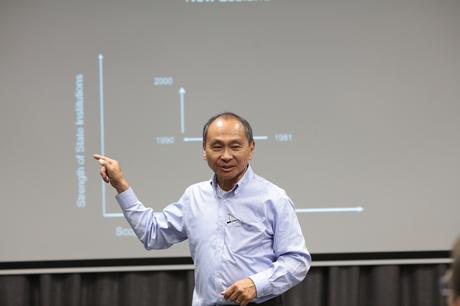
Francis Fukuyama giving a lecture about case study methodology at the Leadership Academy for Development in Ukraine.
Ukraine is a resource rich country, an entrepreneurial country, a country filled with talented individuals who work hard for their families, but why do so many Ukrainian people live in poverty? The answer, perhaps, is public governance, or more precisely, a lack thereof.
To be clear, allow us first to define the words “public governance,” as we understand them. Simply put, public governance is the relationship of power among the government, civil society, and the market. Given the strong skepticism concerning democracy in nations near Ukraine, without improvement in the standard of living of Ukrainians, the Ukrainian people may soon lose their excitement about their own bustling and fledgling democracy. In short, Ukraine’s democracy must begin to deliver tangible benefits to its citizens.
Thus, in our opinion, good public governance in Ukraine would entail a system of checks and balances over government powers by actors in both civil society and the market. In order for Ukraine to become a wealthy and democratic nation integrated with world markets, each institution – government, civil society, and the market – must fulfill its role. Therefore, Ukraine should strengthen and consolidate its government institutions before it expands the scope of government functions. Otherwise, Ukraine’s economic and political development will continue to be hindered by rampant corruption.
The Soviet legacy of collectivization and subsequent privatization of state assets to connected insiders left a dearth of institutional capacity in civil society to maintain a balance of government power and a market that rewarded connections over merit and hard work and privatized profits while shifting losses to the public ledger. Only now, a full generation since market-oriented reforms were first put into effect, the balance of power between the institutions of public governance is slowly starting to materialize. Ukraine’s civil society is finally coming into its own, and new businesses, built without the assistance of legacy Soviet assets acquired through slick schemes, are beginning to emerge. Civil society and these new Ukrainian businesses are beginning to assert themselves and demand a Ukrainian government that is accountable to citizens and businesses, alike.
What of the Ukrainian government itself?
Two revolutions have proven that the Ukrainian people will not tolerate a government squandering tax receipts and bleeding the country’s businesses for personal gain. While strides towards a more responsive government have been made, more must be done. No matter how robust, civil society cannot take over the roles of government, and Ukraine’s market desperately needs more investment and entrepreneur-friendly policies in order for Ukrainians to expand their businesses and attract additional investment.
For Ukraine to succeed it needs an accountable, efficient, and transparent government. In this spirit, the Center for International Private Enterprise, the Center on Democracy, Development and Rule of Law at Stanford University, and Ukrainian Catholic University, are building an executive level education program, the Leadership Academy for Development in Ukraine, for those Ukrainian administrators who are committed to creating a more responsive, competent, and fair government. The Leadership Academy for Development in Ukraine will train government officials and business leaders to help the private sector to become a constructive force for economic growth and development. It will teach carefully selected participants how to be effective reform leaders, to promote sound public policies in complex and contentious settings. As a testament to the importance of this initiative, Professor Francis Fukuyama of Stanford University, one of the world’s preeminent political economists, has committed to spending two weeks in Ukraine over the next six months to assist us in setting up this vital initiative. Moving forward we believe that this initiative will benefit the best and brightest minds in the Ukrainian government, creating a network of reform-minded government innovators to move public governance, and Ukraine’s economy, forward.
We believe this initiative can serve as a catalyst to create the government that the Ukrainian people expect and deserve, finally bringing about the tangible material benefits of good public governance to Ukrainian citizens, specifically a robust growing economy with a burgeoning middle class.
Authors:
Eric Hontz is a Program Officer at the Center for International Private Enterprise in Washington, DC.
Pavlo Sheremeta is the founder of the School of Public Management at Ukrainian Catholic University and the former Minister of Trade and Economic Development of Ukraine.

